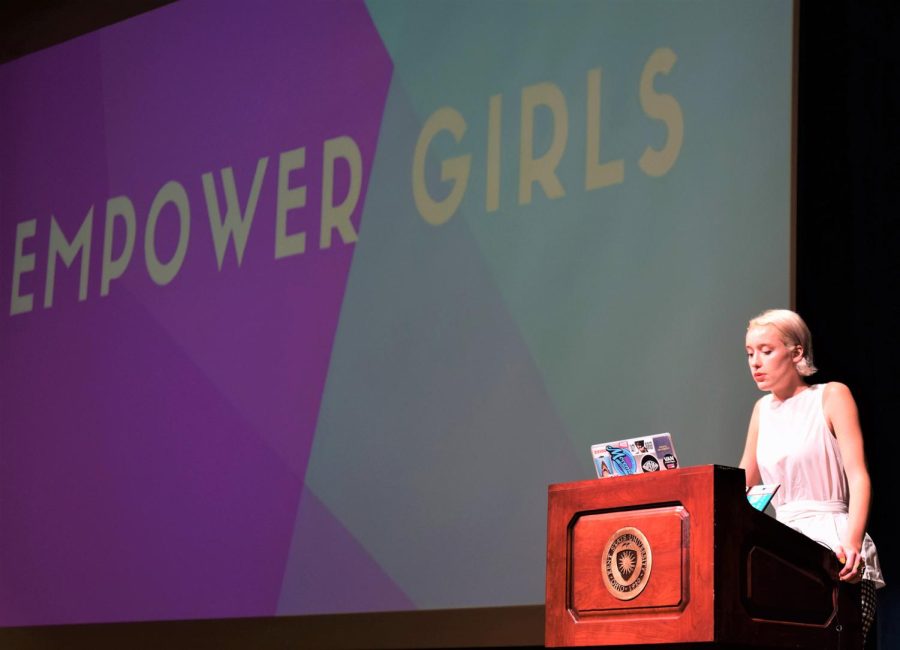EmPOWER Girls Speaker Series highlights females, importance of equality
Caris Kuhn, a junior political science major, gives a speech on the importance of female empowerment.
October 11, 2017
Female student leaders gave a series of speeches and presentations on the importance of empowering women and promoting equality in the EmPOWER Girls Speaker Series, hosted by UNICEF KSU Tuesday.
The event, held in the Kiva, kicked off with an introduction made by UNICEF KSU president Emma Getz, a junior human development and family studies major.
“During times of crisis, girls are even more subjected to violence, and are not getting needed menstrual products,” Getz said.
Five speakers took the stage to express personal feelings and perspectives on the current status of women in the world. Each speaker addressed a series of problems they hoped to fix.
“We must not rest until we achieve gender equality in the workplace,” said Alexa Marshall, a sophomore middle childhood education major and UNICEF KSU associate membership director. “Less than 12 percent of countries have women leaders.”
According to the American Association of University Women, in 2016, women working full time in the United States were paid 80 percent of what men were paid.
“We have to open the door for the next generation of women,” Marshall said.
Also, according to the American Association of University Women, in 2015, 13 percent of American women ages 18–64 were living below the federal poverty level, compared to 10 percent of men.
“Women have to overcome external obstacles that men don’t usually have to deal with,” said Mara Cash, a junior psychology major and president of KSU Feminist Club.
Disparity issues between genders exist on Kent State’s campus as well, said Iniah Dunbar, a senior sociology major and president of BUS.
Dunbar said there have been five female presidents of Black United Students since 1968, and women have to deal with people thinking men can do a better job, said Iniah Dunbar, a senior sociology major and president of BUS.
“Women throughout history have broken society’s constraints,” said Clare Goebel, a senior special education major and member of the College Democrats. “Women are deserving of every opportunity in the world.”
Women are also economically disadvantaged compared to men, Kuhn said.
“There are about 1.5 billion people living in poverty in the world, with 60 to 70 percent being women,” said Caris Kuhn, a junior political science major and the College Democrats communication director. “Being a feminist means to be a humanitarian. I think we all need to be feminists. The power of the people is real.”
Dania Mofleh, a first-year public health graduate student and UNICEF secretary, worked in Jordan as a primary physician.
Mofleh said Syrian refugees in Jordan easily fall victim to gender-based violence and young girls are left without families.
“Gender-based violence includes partner violence, forced prostitution and trafficking,” Mofleh said. “Twenty women in Jordan are killed each year by male family members. One out of three girls are victim to early marriage.”
According to UN Women, about 120 million girls worldwide have experienced forced intercourse or forced sexual acts during their lives, with the most common perpetrators of sexual violence against girls being current or former husbands, partners or boyfriends.
“Education is important for all of us, so one day we can advocate for other kids,” Mofleh said.
Hannah Sheridan is the women’s and LGBTQ issues reporter. Contact her at [email protected].












